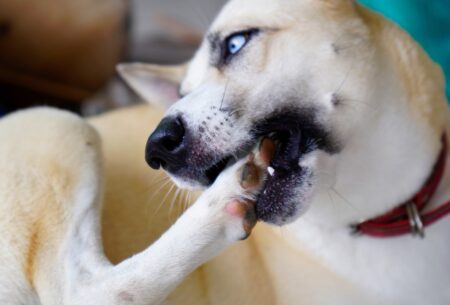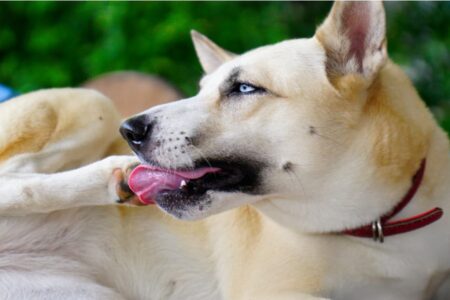
Dogs Chewing Paws and Nails: Why And How to Stop It
Dogs have a natural tendency to chew on objects, including their paws and nails, as a form of self-soothing or to alleviate boredom and stress. However, excessive chewing can be a sign of underlying health issues or behavioral problems. In this article, we will discuss the reasons why dogs chew their paws and nails, and provide you with some tips and techniques to help stop this behavior. So, whether your dog is chewing due to anxiety, boredom, or a medical condition, this guide will help you find a solution that works for you and your furry friend.
SEE ALSO: All You Need To Know About Weimardoodle
Dogs Chewing Paws and Nails: Why?
Dogs can chew their paws and nails for several reasons, including:
1. Allergies and Skin Irritation:
Dogs with allergies or skin irritations may chew their paws and nails as a way to soothe the itching and discomfort.
2. Stress and Anxiety:
Dogs may chew their paws and nails as a way to relieve anxiety or stress, particularly if they are left alone for long periods.
3. Boredom:
Dogs that are bored or under-stimulated may chew their paws and nails as a way to entertain themselves.
4. Pain and Injury:
Dogs may chew their paws and nails as a way to alleviate pain or discomfort from an injury or health condition.
5. Lack of Exercise:
Dogs that are not getting enough exercise may chew their paws and nails as a way to burn off excess energy.
6. Poor Nutrition:
Dogs that are not getting enough nutrients in their diet may chew their paws and nails as a way to satisfy their nutritional needs.
7. Compulsive Behavior:
Some dogs may engage in excessive chewing as a form of compulsive behavior, which can be difficult to manage without professional help.
8. Prey Drive:
Some dogs may chew their paws and nails as a way to satisfy their prey drive, particularly if they are not getting enough opportunities to chase and catch things.
9. Attention Seeking:
Dogs may chew their paws and nails as a way to get attention from their owners, particularly if they are not getting enough attention and affection.
10. Dental Problems:
Dogs with dental problems may chew their paws and nails as a way to alleviate discomfort or pain in their teeth and gums.
Why Does My Dog Chew His Paws at Night?
Chewing paws at night could be a sign that your dog is experiencing anxiety or stress. It could also be a sign that he is uncomfortable due to allergies or skin irritation. If your dog has been chewing his paws at night for an extended period, it is important to consult with your veterinarian to rule out any underlying health issues.
Your veterinarian may recommend anti-itch creams, corticosteroids, or other treatments to help alleviate the discomfort and itching associated with allergies or skin irritations and they may also recommend behavior modification techniques, such as crate training, to help your dog cope with anxiety or stress.
Ways to Know If Your Dog Is In Pain from Chewing Paws and Nails
There are several signs that your dog may be in pain from chewing his paws and nails, including:
- Increased chewing or licking of paws and nails: If your dog is chewing or licking his paws and nails more frequently than usual, it could be a sign that he is in pain.
- Redness or inflammation of paws and nails: If your dog’s paws or nails are red or inflamed, it could be a sign that he is experiencing pain or discomfort.
- Limping or favoring one paw: If your dog is limping or favoring one paw, it could be a sign that he is experiencing pain in that paw.
- Difficulty walking or standing: If your dog is having difficulty walking or standing, it could be a sign that he is experiencing pain in his paws or nails.
- Increased vocalization or whining: If your dog is whining or vocalizing more frequently than usual, it could be a sign that he is in pain.
- Behavior change: If your dog is exhibiting changes in behavior like becoming more aggressive or less active, it could be a sign that he is in pain.
- Decreased appetite or weight loss: If your dog is not eating as much as usual or losing weight, it could be a sign that he is experiencing pain or discomfort.
- Excessive grooming: If your dog is grooming himself excessively, particularly around his paws and nails, it could be a sign that he is experiencing pain or discomfort.
How to Stop Your Dog From Chewing Paws and Nails
These are several steps you can take to stop your dog from chewing his paws and nails:
1. Identify and address any underlying health issues:
If your dog is chewing his paws and nails due to a health issue, such as allergies or pain, it is important to address the issue with your veterinarian.
2. Keep your dog’s paws clean and dry:
Keeping your dog’s paws clean and dry can help prevent itching and discomfort.
3. Provide mental and physical stimulation:
Providing your dog with regular exercise and mental stimulation can help reduce boredom and stress, which can contribute to excessive chewing.
4. Use bitter-tasting sprays or creams:
There are several bitter-tasting sprays or creams available that can be applied to your dog’s paws and nails to discourage chewing.
5. Use positive reinforcement:
Reward your dog with treats or praise when he stops chewing his paws and nails, to encourage him to continue the behavior.
6. Use deterrents:
There are several deterrents, such as anti-chew collars, that can be used to prevent your dog from chewing his paws and nails.
7. Use a chew toy:
Providing your dog with a chew toy can help satisfy his need to chew and reduce his urge to chew his paws and nails.
8. Seek professional help:
If you are unable to stop your dog from chewing his paws and nails, it may be helpful to consult with a veterinarian or dog behaviorist for additional guidance.
Treatment for Dog-Biting Paws
Treatment for dog-biting paws may include a combination of medical and behavioral interventions. Here are some treatment options:
- Medical Treatment: Medical treatment for dog-biting paws may include antibiotics to treat any infections or pain medications to reduce discomfort.
- Antiseptic Treatment: Antiseptic treatments, such as povidone-iodine solutions, can be used to clean the affected areas and help prevent infection.
- Bandaging: Bandaging can be used to prevent your dog from chewing his paws and to protect the affected areas from further damage.
- Behavior Modification: Behavior modification techniques, such as desensitization and counterconditioning, can be used to teach your dog to associate the sight and smell of his paws with positive experiences, such as treats or praise.
- Habituation: Habituation is a process of gradually exposing your dog to the sight and smell of his paws, starting with brief exposures and increasing the duration of exposure.
Spray to Stop Dog-Chewing Paws
There are several sprays available that are designed to stop dogs from chewing their paws. Some of these sprays include:
- Grannick’s Bitter Apple Spray: This spray contains a bitter taste that is unpleasant to dogs and can deter them from chewing their paws.
- Fooey! Ultra Bitter Spray: This spray contains a bitter taste that is unpleasant to dogs and can deter them from chewing their paws.
- Four Paws No Chew Bitter Apple Spray: This spray contains a bitter taste that is unpleasant to dogs and can deter them from chewing their paws.
These sprays can be purchased at many pet stores, including:
- Petco: Petco is a large pet retailer that carries a wide range of pet products, including sprays to stop dogs from chewing their paws.
- PetSmart: PetSmart is a large pet retailer that carries a wide range of pet products, including sprays to stop dogs from chewing their paws.
- Amazon: Amazon is an online retailer that carries a wide range of pet products, including sprays to stop dogs from chewing their paws.
Home Remedies to Stop Dogs from Chewing Paws
Here are some home remedies that can help stop dogs from chewing their paws:
- Apple Cider Vinegar: Apple cider vinegar can be diluted and applied to your dog’s paws to deter them from chewing.
- Baking Soda: Baking soda can be mixed with water and applied to your dog’s paws to soothe itching and irritation.
- Coconut Oil: Coconut oil can be applied to your dog’s paws to moisturize and soothe dry skin.
- Salt Soak: A salt soak can be used to relieve itching and discomfort in your dog’s paws. Mix one cup of warm water with a teaspoon of Epsom salt and soak your dog’s paws in the solution for 5-10 minutes.
- Olive Oil: Olive oil can be applied to your dog’s paws to moisturize and soothe dry skin.
- Aloe Vera: Aloe vera can be applied to your dog’s paws to soothe itching and irritation.
- Essential Oils: Essential oils, such as lavender or tea tree oil, can be diluted with water and applied to your dog’s paws to relieve itching and discomfort.
- Ginger: Ginger can be mixed with water and applied to your dog’s paws to soothe itching and inflammation.
- Lemon Juice: Lemon juice can be mixed with water and applied to your dog’s paws to deter them from chewing and relieve itching.
But, always remember to consult with your veterinarian before trying any of these home remedies to ensure they are safe and effective for your dog.
SEE ALSO: How Long Do Yorkies Live? Their Life Expectancy by Gender and More
Conclusion
Dogs chewing their paws and nails can be caused by several reasons like allergies, boredom, stress, or health issues and to stop this behavior, it is important to identify the underlying cause and address it accordingly.
Several medical and behavioral interventions can be used to stop dogs from chewing their paws and nails like using sprays or some of the home remedies mentioned above, behavior modification techniques, and providing mental and physical stimulation.


